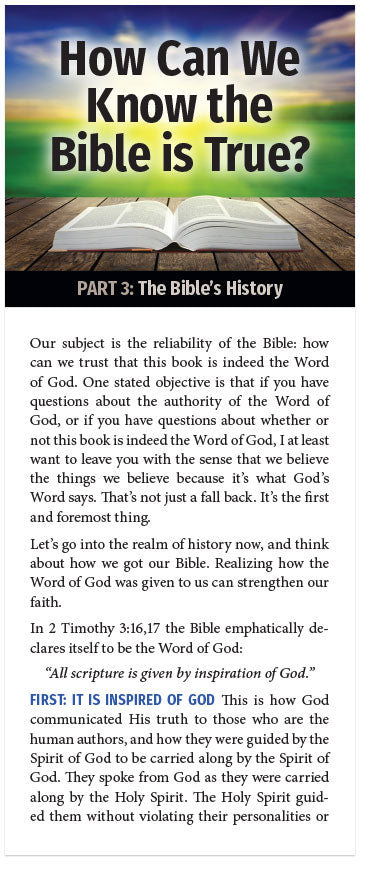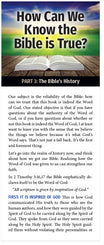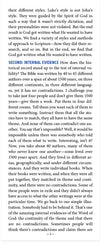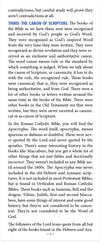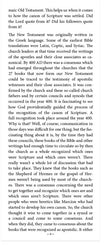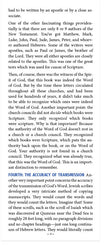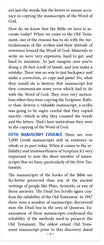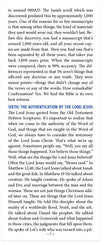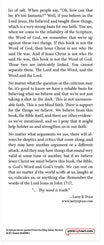How Can We Know The Bible Is True? (Part 3 of 5)
Special-Order Folded Flyer Tract
 NOTE: This item is custom-printed to order (click for more details).
NOTE: This item is custom-printed to order (click for more details).
This tract is from our print-on-demand library, and is not kept in stock. Select the options below, and we will custom-print a batch just for you. Because this item is custom-printed, you can add your custom imprint to the back page at no extra cost.
- Estimated shipping date: Friday, January 2 (Click for more details)
- SKU:
- Discounts: Discount coupons do not apply to this item
- Format: Folded Flyer Tract
- Size: 3.5 inches x 8.5 inches
- Pages: 8
- Imprinting: Available with 4 lines of custom text
- Version: KJV
- Returns: Because this item is custom-printed to order, it cannot be returned.
Show all item details
The full text of this flyer tract is shown below in the KJV version. (Do you want to print this tract in a different version than the one listed? Contact us and let us know what you're looking for—we may be able to create the alternate version for you at no charge.)
Our subject is the reliability of the Bible: how can we trust that this book is indeed the Word of God. One stated objective is that if you have questions about the authority of the Word of God, or if you have questions about whether or not this book is indeed the Word of God, I at least want to leave you with the sense that we believe the things we believe because it’s what God’s Word says. That’s not just a fall back. It’s the first and foremost thing.
Let’s go into the realm of history now, and think about how we got our Bible. Realizing how the Word of God was given to us can strengthen our faith.
In 2 Timothy 3:16,17 the Bible emphatically declares itself to be the Word of God:
“All scripture is given by inspiration of God.”
First: It Is Inspired of God This is how God communicated His truth to those who are the human authors, and how they were guided by the Spirit of God to be carried along by the Spirit of God. They spoke from God as they were carried along by the Holy Spirit. The Holy Spirit guided them without violating their personalities or their different styles. Luke’s style is not John’s style. They were guided by the Spirit of God in such a way that it wasn’t strictly dictation, and their personalities were not violated. But the end result is God got written what He wanted to have written. We find a variety of styles and methods of approach to Scripture—how they did their research, and so on. But in the end, we find that God got written what He wanted to have written.
Second: Internal Evidence How does the historical record stand up to the test of internal validity? The Bible was written by 40 to 45 different authors over a span of about 1500 years, on three different continents, in three different languages, yet it has no contradictions. I challenge you to take just four people and don’t give them 1500 years—give them a week. Put them in four different rooms. Tell them you want each of them to write something. Instruct them that all the stories have to match, they all have to have the same theme. And none of them can contradict one another. You say that’s impossible? Well, it would be impossible unless there was somebody who told each of them what to write. Interesting, isn’t it? Now, you take about 40 authors, many of them who never knew one another—some lived over 1500 years apart. And they lived in different areas, geographically, and under different circumstances. And they write individual books. When their books were written, and when they were all put together, they matched in theme and continuity, and there were no contradictions. Some of these people were in exile and they didn’t always have access to what the other writings were at the particular time. We go back to our simple illustration. Somebody had to be behind it. That’s one of the amazing internal evidences of the Word of God: the continuity of the theme and that there are no contradictions. Sometimes people will think there’s contradictions and claim there are contradictions, but careful study will prove they aren’t contradictions at all.
Third: The Canon of Scripture The books of the Bible as we have them now were recognized and received by God’s people as God’s Word. They were recognized as God’s inspired Word from the very time they were written. They were recognized as divine revelation and they were received as an exclusive and authoritative canon. The word canon means rule or the standard by which something is judged. When we talk about the canon of Scripture, or canonicity, it has to do with the rule, the recognized rule. These books were canonical, that is, they were recognized as being authoritative, and from God. There were a lot of other books or letters written around the same time as the books of the Bible. There were other books in the Old Testament era that were written, but they were never received as canonical or as canon of Scripture.
In the Roman Catholic Bible, you will find the Apocrypha. The word itself, apocrypha, means spurious or dubious or doubtful. These were never quoted by the Lord and never quoted by the apostles. There’s some interesting history in the books like Maccabees, but you get a whole lot of other things that are just fables and doctrinally incorrect. They weren’t included in any Bible until around the 1400s. The Apocrypha was never included in the old Hebrew and Aramaic scriptures. It is not included in most Protestant Bibles, but is found in Orthodox and Roman Catholic Bibles. These books such as Susanna, Bell and the dragon, Tobias, Judith, first and second Maccabees, have some things of interest and some good history, but they’re not considered to be canonical. They’re not considered to be the Word of God.
The followers of the Lord Jesus quote from all but eight of the books found in the Hebrew and Aramaic Old Testament. This helps us when it comes to how the canon of Scripture was settled. Did the Lord quote from it? Did his followers quote from it?
The New Testament was originally written in the Greek language. Some of the earliest Bible translations were Latin, Coptic, and Syriac. The church leaders at that time received the writings of the apostles and their close associates as canonical. By 400 AD there was a consensus which had emerged throughout the churches that the 27 books that now form our New Testament could be traced to the testimony of apostolic witnesses and their close associates. It was confirmed by the church and these so-called church fathers and by certain councils and synods that occurred in the year 400. It is fascinating to see how God providentially guided the process of the recognition of the canon of Scripture. A full recognition took place around the year 400. Why is that? Well, of course, communication in those days was difficult for one thing, but the fascinating thing about it is, by the time they had these councils, these books of the Bible and other writings had enough time to circulate so by then the church as a whole recognized which ones were Scripture and which ones weren’t. There really wasn’t a whole lot of discussion that had to take place. They knew that the books such as the Shepherd of Hermes or the gospel of Hermes weren’t being used by most of the churches. There was a consensus concerning the need to get together and recognize which ones are and which ones aren’t Scripture. There were other people who were heretics like Marcion who had started to develop his own canon. So, the church thought it wise to come together in a synod or a council and come to some consensus. And when they did, they came to consensus about the books that were recognized as apostolic. It either had to be written by an apostle or by a close associate.
One of the other fascinating things providentially is that there are only 8 or 9 authors of the New Testament. You’ve got Matthew, Mark, Luke, John, Paul, Jude, James, Peter, and whoever authored Hebrews. Some of the writers were apostles, such as Paul or James, the brother of the Lord. They were all either apostles are closely related to the apostles. This was one of the great tests which was used for canon of Scripture.
Then, of course, there was the witness of the Spirit of God, that this book was indeed the Word of God. But by the time these letters circulated throughout all these churches, and had been used for hundreds of years, it didn’t take much to be able to recognize which ones were indeed the Word of God. Another important point: the church councils did not decide which books were Scripture. They only recognized which books were scripture. Why is that important? Because the authority of the Word of God doesn’t rest in a church or a church council. They recognized which books were Scripture, which puts the authority back upon the book, or on the Word of God. Your authority is not found in a church council. They recognized what was already true, that this was the Word of God. This is an important distinction to remember.
Fourth: The Accuracy of Transmission Another very important point concerns the accuracy of the transmission of God’s Word. Jewish scribes developed a very intricate method of copying manuscripts. They would count the words and they would count the letters. Imagine that! Some of these scrolls, such as the scroll of Isaiah which was discovered at Qumran near the Dead Sea is roughly 28 feet long, with no paragraph divisions and no chapter headings—just one long continuum of Hebrew letters. They would literally count not just the words, but the letters to ensure accuracy in copying the manuscripts of the Word of God.
How do we know that the Bible we have is accurate today? When we come to the Old Testament, one of the reasons has to do with the meticulousness of the scribes and their attitude of reverence toward the Word of God. Materials to write on were very expensive, hard to get, and hard to maintain. So just imagine now you’re doing a 28-foot scroll of Isaiah, and you make a mistake. There was no way to just backspace and make a correction, or copy and paste! No, what they would do is destroy that manuscript lest they communicate some error which had to do with the Word of God. They were very meticulous when they were copying the Scripture. Rather than destroy a valuable manuscript, a scribe was going to be super careful that they copied exactly—which is why they counted the words and the letters. That’s how meticulous they were in the copying of the Word of God.
Fifth: Manuscript Evidence There are over 5,000 Greek manuscripts still in existence in whole or in part today. When it comes to the reliability and trustworthiness of Scripture it’s very important to note the sheer number of manuscripts that we have, particularly of the New Testament.
The manuscripts of the books of the Bible are far-better preserved than any of the ancient writings of people like Plato, Aristotle, or any of those ancients. The Dead Sea Scrolls again confirm the reliability of the Old Testament. In 1947 there were a number of manuscripts discovered near the Dead Sea in the area of Qumran. Examination of these manuscripts confirmed the reliability of the methods used to preserve the Old Testament. The oldest extant Old Testament manuscript prior to this discovery dated to around 900AD. The Isaiah scroll which was discovered predated this by approximately 1,000 years. One of the reasons for so few manuscripts is that among other things, the kind of materials they used would wear out, they wouldn’t last. Before this discovery, you had a manuscript that’s around 1,000 years old, and all your recent copies are made from that. Then you find one that’s been separated by all these years, that takes you back 1,000 years prior. When the manuscripts were compared, there is 99% accuracy. The differences represented in that 1% aren’t things that affected any doctrine or any truth. They were minor points—things that didn’t change any of the verses or any of the words. How remarkable! Confirmation? Yes. We find the Bible is its own best witness.
Sixth: The Authentication By the Lord Jesus The Lord Jesus quoted from the Old Testament Hebrew Scriptures. It’s important to realize that when we come to the authority of the Word of God, and things that are taught in the Word of God, we always have to consider the testimony of the Lord Jesus Christ. That’s what we’re up against. Sometimes people say, “Well, you say all those things happened. You believe those things.” Well, what are the things the Lord Jesus believed? Often the Lord Jesus would say, “Moses said.” In Matthew 12:40, the Lord Jesus talked about Jonah and the great fish. In Matthew 19 He talked about creation. He taught creation, He spoke of Adam and Eve, and marriage between the man and the woman. These are not just things Christians added later on. These are things that the Lord Jesus Himself taught. He told His disciples about the reality of a worldwide flood, Noah, and the ark. He talked about Daniel the prophet. He talked about Sodom and Gomorrah and what happened to those cities, the judgments that fell upon them. He spoke of Lot’s wife who was turned into a pillar of salt. When people say, “Oh, how can that be; it’s too fantastic?” Well, if you believe in the Lord Jesus, He believed and taught these things, which is a very strong basis for our faith. You see, when we come to the reliability of the Scripture, the Word of God, we remember that we’re up against these two things. If this book is not the Word of God, then Jesus Christ is not who He said He was. And if Jesus Christ is not who He said He was, this book is not the Word of God. Those two are intricately linked. You cannot separate them. The Lord and the Word, and the Word and the Lord.
No matter what the question or the criticism may be, it’s good to know we have a reliable basis for believing what we believe and that we’re not just taking a shot in the dark. This is not unreasonable faith. This is not blind faith. There is support for the things we believe. We believe from this book, the Bible itself, and there are other evidences we’ve mentioned, and so I pray that it might help bolster us and strengthen us in our faith.
No matter what arguments we use, there will always be skeptics and critics that come along, and they may have another argument or a different attack. And they may have things that sound very valid at some time or another, but if we believe Jesus Christ we must believe this book, the Bible, is God’s Word and God’s truth. We can rest on that no matter if the world scoffs at us, laughs at us, ridicules us, or anything else. Remember the words of the Lord Jesus in John 17:17,
“… Thy word is truth”
—Larry R. Price
www.larryrprice.com

